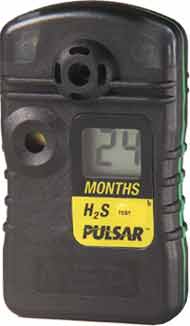| That is
a question not all single gas detectors can answer. Getting
it wrong is unthinkable. Getting it right is what MSA’s
Pulsar® Alarm does best. Two
crews were working side by side in a Texas City, Texas,
refinery. An  AltairStrickland,
Inc., crew was using Pulsar Alarms; the other crew carried
another brand of gas detector. Elsewhere in the refinery,
someone switching lines caused a hydrogen sulfide gas release.
The Pulsar units went into alarm. But--the other crew’s
gas detectors were mute. AltairStrickland,
Inc., crew was using Pulsar Alarms; the other crew carried
another brand of gas detector. Elsewhere in the refinery,
someone switching lines caused a hydrogen sulfide gas release.
The Pulsar units went into alarm. But--the other crew’s
gas detectors were mute.
Fred Phillips, a foreman for AltairStrickland,
wasn’t surprised. “I’ve tried ’em
all and come to rely on MSA quality.” Fortunately,
for all the workers involved, the Pulsar Alarm’s sensors
performed reliably. Both crews evacuated the area safely
and waited for the gas to dissipate.
Phillips continued, telling of one refinery
worker perplexed about another brand of single gas detectors
that “just chirp and chirp and chirp for no reason
at all. They just couldn’t get ’em stopped.”
Alarmed, another worker asked, “Where’ve
you been?”
With a tickle in his East Texas drawl,
Phillips reenacted the reply, “I’ve been over
here in the lunch tent!”
(Methinks either there’s something
rotten in someone’s lunchbox or THAT gas alarm doth
protest TOO much!) |